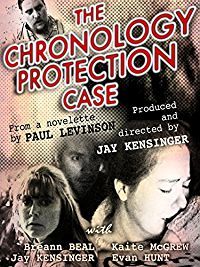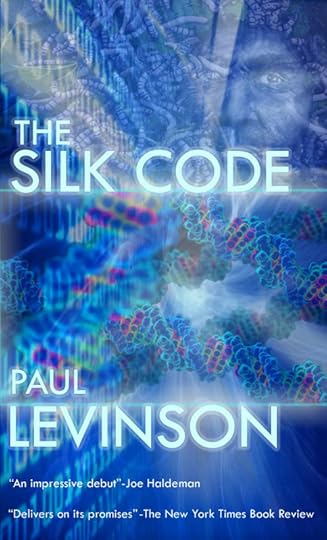Paul Levinson's Blog: Levinson at Large, page 215
June 25, 2017
Twin Peaks: The Return 1.8: Atom Bomb
 Anyone who doubted that Twin Peaks is one bizarre science fiction horror story of a story got their answer tonight in episode 1.8: it is, with a vengeance, spun of gut-wrenching, stomach-churning, searingly mind-blowing wordless narrative the likes of which you don't often see on any television, unless you're maybe watching Donnie Darko someplace the 20th time.
Anyone who doubted that Twin Peaks is one bizarre science fiction horror story of a story got their answer tonight in episode 1.8: it is, with a vengeance, spun of gut-wrenching, stomach-churning, searingly mind-blowing wordless narrative the likes of which you don't often see on any television, unless you're maybe watching Donnie Darko someplace the 20th time.Also - I'm pretty sure we got an answer of sorts to what brought the alternate reality or realities into being: the first atom bomb test in White Sands, New Mexico in 1945. This indeed was first atom bomb ever exploded (as far as I know) on this Earth, and who knows about the universe. If I'm getting the silent movie correctly, which was the most powerful part of tonight's extraordinary episode, that first atom bomb brought into being the alternate reality or alternate universe and all the insanity it's brought us in all the Twin Peaks stories. You could almost hear the atoms crying in anguish as they were torn apart - more than enough to create an alternate reality. (Come to think of it, that's how Bizarro Superman was brought into being.)
At very least, we saw Laura Palmer's iconic young face in the little globe that was one of the products of what the blast wrought. Also spawned tonight and a decade after the blast was a homicidal maniac - the woodsman - who only wants a light, but kills the receptionist and dj at the radio station playing The Platters' "My Prayer," and whose talking into the microphone (the woodsman's, that is) in turn kills more people, including a teenager who was just kissed but later has some grotesque insect with maybe human legs crawl into her sleeping or dead mouth (I told you this was horror - of the classic 1950s variety, raised or razed up a notch, to be more precise).
The one thing we can't be sure of is whether the atom bomb brought into being the alternate reality, or whether the alternate world already existed but was understandably agitated and aggravated by the bomb. Doesn't ultimately matter, though, because it probably all amounts to the same thing.
None of this has any discernible connection to our 2017 story - though, hey, an atom bomb creating an alternate monstrous world should be enough of a story for one hour. But we do get a significant step forward anyway in that 2017 story, at the beginning, when evil Cooper is killed, but monsters from the alternate world bring him back to life. It's tough indeed to get rid of bad guys in this nightmare.
I was hoping against hope that the atom bomb would waken good Cooper from his stupor, but I guess it's still too early in our story at this point for that to happen, and since the atom bomb was already exploded in 1945, long before Cooper was put in his stupor, it wouldn't make sense for that same bomb to now bring him out of his stupor. (There is some underlying logic in this story - at least, I hope so.)
I'll tell you one thing: I'm glad I've been listening these days to Sirius/XM's Beatles channel in my car and not any broadcast radio. That atom bomb couldn't have an effect on satellite radio - uh, could it??
See also Twin Peaks: The Return 1.1-2: Superluminal Sans Cherry Pie ... 1.3-4: Coffee and Cole ... 1.5: The Mod Squad Meets Big Love in the Diner ... 1.6: Red Door and Childish Scribbles ... 1.7: Lost and Not Lost
FREE on Amazon Prime
Available on Prime
 Paul Levinson's books ... Paul Levinson's music
Paul Levinson's books ... Paul Levinson's music
Published on June 25, 2017 21:24
June 21, 2017
Gomorrah Season 2 Finale: The Brutal Analysis
 Hey, I haven't been reviewing Gomorrah - the justly lionized Italian mafia series that takes place in Naples, and in Italian (with English subtitles) - but there's no time like the present, with the finale of the second season just on Sundance.
Hey, I haven't been reviewing Gomorrah - the justly lionized Italian mafia series that takes place in Naples, and in Italian (with English subtitles) - but there's no time like the present, with the finale of the second season just on Sundance.I'm not going to recap everything that came before - except to say it's an excellent series. If you haven't seen it, don't read anything further, because this discussion of the Season 2 finale will obviously have spoilers.
That finale features a good twist at the very end, as Ciro, with Genny's help, kills Pietro (Genny's father). This season was aired in the UK last year, and the ending evoked a lot of criticism. Why would Genny enable the killing of his own father, rather than kill Ciro, the man who had killed Genny's mother and humiliated him when he was younger?
This is a complex story, but the answer is straightforward. To the very end, Pietro continued to belittle Genny and treat him like a child. This was clearly warranted in the first season, but clearly not in the second: it was clear to everyone except Pietro that Genny was his own man.
Gomorrah has been compared to The Sopranos, but unlike The Sopranos, there's barely the scent of a hero in Gomorrah. Genny, I suppose, is the closest to it - but what kind of hero sets up the killing of his own father? I certainly preferred Ciro over Pietro, but, jeez, Ciro murdered his own wife. And though Pietro had a steely appeal, killing Ciro's daughter is flagrantly unacceptable.
Yet within this brutal story, there's somehow room for a little tenderness. We see this in Genny's son, whom he names Pietro, and in the woman (Patrizia) Pietro was going to marry - indeed, she is also one of the most appealing characters in the story.
I hope we see her next season, which will no doubt be Genny's story. Pietro would have won, had it not been for Genny. But I can't see any alliance between Genny and Ciro lasting too long.
Meanwhile, strong acting by Marco D'Amore (Ciro), Salvatore Esposito (Genny), Fortunato Cerlino (Pietro), and Cristiana Dell'Anna ( Patrizia).
Paul Levinson's books ... Paul Levinson's music
Published on June 21, 2017 21:34
June 18, 2017
Twin Peaks: The Return 1.7: Lost and Not Lost
 First, let me mention that Twin Peaks, especially The Return, has a lot resonance or resemblance to Lost. If you don't know what that means, I can't help you.
First, let me mention that Twin Peaks, especially The Return, has a lot resonance or resemblance to Lost. If you don't know what that means, I can't help you.Meanwhile, episode 1.7 is the most informative so far in The Return, so much so that I'm beginning to feel a little non-lost, at last.
The FBI and the Sheriff are both beginning to - slowly - close in on finding good Agent Cooper, still, mostly, in a stupor. But he had great moves in stopping the midget alter-dimensional psycho, and he also continued his rehabilitation by responding well to "Agent" - bringing the total of words he's now responded to, showing an awareness of his true identity, to I think three now, right?
And speaking of the FBI and the Sheriff, this episode had three stand-out performances by old white guys - David Lynch at his stentorian best as the FBI honcho, Robert Forster as the deadpan local sheriff, and James Morrison (not Jim) as the warden. (Morrison, by the way, was last seen to great effect in 24, which, believe it or not, at least to me, also has some indefinable connection to Twin Peaks).
Also noticeable in this episode is no band performing at the end, or anywhere in the episode. Instead, we get a great scene with the instrumental "Green Onions" playing as someone sweeps the floor - I mean, sweeps up the entire floor - of a bar, with the attention to task that one would find in a scene with someone sweeping the floor of a barber shop. Maybe this was in lieu of barbershop harmony? Or, more likely, you didn't need a song with words in this episode, because so many of the words in the hour added up to some kind of sense, a high-point for the series return so far. And, as if to underscore this point, we also have an instrumental ending - Santo & Johnny's "Sleep Walk" - which is so obviously relevant to Twin Peaks it's ridiculous though it still worked beautifully.
And I'll see you again next week.
See also Twin Peaks: The Return 1.1-2: Superluminal Sans Cherry Pie ... 1.3-4: Coffee and Cole ... 1.5: The Mod Squad Meets Big Love in the Diner ... 1.6: Red Door and Childish Scribbles
FREE on Amazon Prime
Available on Prime
 Paul Levinson's books ... Paul Levinson's music
Paul Levinson's books ... Paul Levinson's music
Published on June 18, 2017 21:45
Abject Stupidity of Bank of America and Delta Airlines in Withdrawing Support from New York Public Theater
One of the stupidest, saddest pieces of news in the past week was Bank of America and Delta Airlines withdrawing their sponsorship of the New York Public Theater's production of Shakespeare's Julius Caesar because ... the production presented Caesar with an orange, Trump-like wig, and, the corporations claimed, glorified Caesar/Trump's assassination.
The people at Bank of America and Delta Airlines are obviously stupid, or maybe ignorant is the better word, because Julius Caesar is not the villain (note to Bank of America and Delta - "villain" means "bad guy") in the play with his name, and neither is his killing glorified. To the contrary, Caesar is the victim, and the villains - not the heroes - are the Senators who stab him to death, most especially the conflicted Brutus. His assassination is presented not as something to be done or emulated, but avoided, if only because it is the undoing of the people who plot to do it and do it. That's the essence of the play. Don't they educate executives at big corporations any more?
But their withdrawal of support for the NY Public Theater is also sad, because it follows the cowardly actions of CNN in firing Kathy Griffin and cancelling Reza Aslan's documentary series because of their criticism of the President. Is this the society we've become, in which we can't tolerate politically lacerating humor (Griffin), cursing out a President (Aslan) - and, by the way, both did this not on CNN's air but their own time - and political commentary in art (NY Public Theater)?
People who believe in freedom of expression should do something about this. I decided last week to watch CNN now about as often as I watch Fox News - almost never. Fortunately, I don't bank with Bank of America, and I'm certainly not going to start. As for Delta, I've flown with them many times, but now I don't intend to do that again.
Americans should stand up and call out these crypto fascists, wherever they rear their heads.
Paul Levinson's books ... Paul Levinson's music
The people at Bank of America and Delta Airlines are obviously stupid, or maybe ignorant is the better word, because Julius Caesar is not the villain (note to Bank of America and Delta - "villain" means "bad guy") in the play with his name, and neither is his killing glorified. To the contrary, Caesar is the victim, and the villains - not the heroes - are the Senators who stab him to death, most especially the conflicted Brutus. His assassination is presented not as something to be done or emulated, but avoided, if only because it is the undoing of the people who plot to do it and do it. That's the essence of the play. Don't they educate executives at big corporations any more?
But their withdrawal of support for the NY Public Theater is also sad, because it follows the cowardly actions of CNN in firing Kathy Griffin and cancelling Reza Aslan's documentary series because of their criticism of the President. Is this the society we've become, in which we can't tolerate politically lacerating humor (Griffin), cursing out a President (Aslan) - and, by the way, both did this not on CNN's air but their own time - and political commentary in art (NY Public Theater)?
People who believe in freedom of expression should do something about this. I decided last week to watch CNN now about as often as I watch Fox News - almost never. Fortunately, I don't bank with Bank of America, and I'm certainly not going to start. As for Delta, I've flown with them many times, but now I don't intend to do that again.
Americans should stand up and call out these crypto fascists, wherever they rear their heads.
Paul Levinson's books ... Paul Levinson's music
Published on June 18, 2017 15:24
Review of Rob Sheffield's Dreaming The Beatles 7 of X: Anatomy of a Ride
 Been a bit since I posted a review of Rob Sheffield's Dreaming the Beatles (some 13 days), mostly because this is not a book to be rush-read or even normally read (whatever pace that might be), but savored, and also because I've been writing some science fiction, and there's also the lure of the cool water and soft beach of Cape Cod Bay. But I wanted to record a few words about Sheffield's chapter on "Ticket to Ride", about as rich and satisfying an extended analysis you can find of a Beatles or any worthy song.
Been a bit since I posted a review of Rob Sheffield's Dreaming the Beatles (some 13 days), mostly because this is not a book to be rush-read or even normally read (whatever pace that might be), but savored, and also because I've been writing some science fiction, and there's also the lure of the cool water and soft beach of Cape Cod Bay. But I wanted to record a few words about Sheffield's chapter on "Ticket to Ride", about as rich and satisfying an extended analysis you can find of a Beatles or any worthy song.I recall well when "Ticket to Ride" came out in the Spring of 1965. My friends and I - especially our group, on its way from The Transits to The New Outlook - knew immediately that "Ticket to Ride" was something different. It had an edge, an imminence, a truth that none of the Beatles' songs quite had before. (The B-side, "Please Don't Wear Red" aka "Yes It Is," is a masterpiece, too, and a personal favorite. Not mentioned by Sheffield in this chapter, but it plays a crucial role in my 1997 Loose Ends.)
Back to "Ticket to Ride" - Sheffield tells us why. It's a song about an adult relationship - Lennon is living with this woman. It's a song pointed at a unique stage in their relationship - she wants to leave, she's bought a ticket to leave, but she hasn't left yet. Maybe she won't leave (unlikely), maybe she'll come back (also unlikely), the only unambiguous note in this story is that she's deeply unhappy about living with John. And as Sheffield aptly says, John is not arguing with her, trying to convince her to stay, he's just at the beginning of trying to understand this.
You just don't usually find relationships at this stage and presented at this level of complexity and ambiguity in love songs, although they are the marrow of real life. This song also checks in on a quiet tally I've been keeping in my head for more than a half a century: can a love song be as socially significant as a song aimed at some social injustice? Dylan's "Just Like A Woman" is one, rare example (so are some of Cole Porter's best works) - but it came a year after "Ticket to Ride". So the Beatles in terms of socially significant love songs got there first, and these two songs are all the evidence one needs that not all love songs are silly, or even just medium wise.
Sheffield also offers more testimony on behalf of George Martin's deft production skills, remarking on the perfect mix of McCartney's harmony on this track, so it provides resonance to Lennon's introspection without intruding on it.
And I'll be back sooner or later with another review.
See also Review of Rob Sheffield's Dreaming the Beatles 1 of X: The Love Affair ... 2 of X: The Heroine with a Thousand Faces ... 3 of X: Dear Beatles ... 4 of X: Paradox George ... 5 of X: The Power of Yeah ... 6 of X: The Case for Ringo
Paul Levinson's books ... Paul Levinson's music
Published on June 18, 2017 09:46
June 12, 2017
Twin Peaks: The Return: 1.6: Red Door and Childish Scribbles
Among the scenes I most enjoyed or found most worthy of remark in last night's episode 1.6 of Twin Peaks, still all-but-incomprehensible in the main, were -
the red door to Dougie aka Agent Cooper's home: I have a front door exactly the same color, so I could relateDougie's boss getting the "childish scribbles" Dougie had drawn on the forms - this was sheer genius, though I'm not sure if this was an emperor's new clothes message or something more profoundthe scene between the guy who looked and was acting like a young Dennis Weaver and the guy who looked and was acting like a young Christopher Walken: with all the decoys and doppels in this story, there was something about this scene which rang very truethe short guy from the other dimensions urging the still largely stupefied Cooper to wake up - this plea had a real poignance, which cut across and through all the fog in Twin Peaksalways welcome to hear talk of cherry pie in that diner Scenes I could have lived without: I don't like seeing children killed, and I'm no fan of homicidal maniacs, either.
Scenes I could have lived without: I don't like seeing children killed, and I'm no fan of homicidal maniacs, either.
But the ending was good with a good song by the girl group, and I'll be back with more random but with any luck at least minimally coherent thoughts next week.
See also Twin Peaks: The Return 1.1-2: Superluminal Sans Cherry Pie ... 1.3-4: Coffee and Cole ... 1.5: The Mod Squad Meets Big Love in the Diner
FREE on Amazon Prime
Available on Prime Paul Levinson's books ... Paul Levinson's music
Paul Levinson's books ... Paul Levinson's music
the red door to Dougie aka Agent Cooper's home: I have a front door exactly the same color, so I could relateDougie's boss getting the "childish scribbles" Dougie had drawn on the forms - this was sheer genius, though I'm not sure if this was an emperor's new clothes message or something more profoundthe scene between the guy who looked and was acting like a young Dennis Weaver and the guy who looked and was acting like a young Christopher Walken: with all the decoys and doppels in this story, there was something about this scene which rang very truethe short guy from the other dimensions urging the still largely stupefied Cooper to wake up - this plea had a real poignance, which cut across and through all the fog in Twin Peaksalways welcome to hear talk of cherry pie in that diner
 Scenes I could have lived without: I don't like seeing children killed, and I'm no fan of homicidal maniacs, either.
Scenes I could have lived without: I don't like seeing children killed, and I'm no fan of homicidal maniacs, either.But the ending was good with a good song by the girl group, and I'll be back with more random but with any luck at least minimally coherent thoughts next week.
See also Twin Peaks: The Return 1.1-2: Superluminal Sans Cherry Pie ... 1.3-4: Coffee and Cole ... 1.5: The Mod Squad Meets Big Love in the Diner
FREE on Amazon Prime
Available on Prime
 Paul Levinson's books ... Paul Levinson's music
Paul Levinson's books ... Paul Levinson's music
Published on June 12, 2017 13:02
Twin Peaks 1.6: Red Door and Childish Scribbles
Among the scenes I most enjoyed or found most worthy of remark in last night's episode 1.6 of Twin Peaks, still all-but-incomprehensible in the main, were -
the red door to Dougie aka Agent Cooper's home: I have a front door exactly the same color, so I could relateDougie's boss getting the "childish scribbles" Dougie had drawn on the forms - this was sheer genius, though I'm not sure if this was an emperor's new clothes message or something more profoundthe scene between the guy who looked and was acting like a young Dennis Weaver and the guy who looked and was acting like a young Christopher Walken: with all the decoys and doppels in this story, there was something about this scene which rang very truethe short guy from the other dimensions urging the still largely stupefied Cooper to wake up - this plea had a real poignance, which cut across and through all the fog in Twin Peaksalways welcome to hear talk of cherry pie in that diner Scenes I could have lived without: I don't like seeing children killed, and I'm no fan of homicidal maniacs, either.
Scenes I could have lived without: I don't like seeing children killed, and I'm no fan of homicidal maniacs, either.
But the ending was good with a good song by the girl group, and I'll be back with more random but with any luck at least minimally coherent thoughts next week.
See also Twin Peaks: The Return 1.1-2: Superluminal Sans Cherry Pie ... 1.3-4: Coffee and Cole ... 1.5: The Mod Squad Meets Big Love in the Diner
FREE on Amazon Prime
Available on Prime Paul Levinson's books ... Paul Levinson's music
Paul Levinson's books ... Paul Levinson's music
the red door to Dougie aka Agent Cooper's home: I have a front door exactly the same color, so I could relateDougie's boss getting the "childish scribbles" Dougie had drawn on the forms - this was sheer genius, though I'm not sure if this was an emperor's new clothes message or something more profoundthe scene between the guy who looked and was acting like a young Dennis Weaver and the guy who looked and was acting like a young Christopher Walken: with all the decoys and doppels in this story, there was something about this scene which rang very truethe short guy from the other dimensions urging the still largely stupefied Cooper to wake up - this plea had a real poignance, which cut across and through all the fog in Twin Peaksalways welcome to hear talk of cherry pie in that diner
 Scenes I could have lived without: I don't like seeing children killed, and I'm no fan of homicidal maniacs, either.
Scenes I could have lived without: I don't like seeing children killed, and I'm no fan of homicidal maniacs, either.But the ending was good with a good song by the girl group, and I'll be back with more random but with any luck at least minimally coherent thoughts next week.
See also Twin Peaks: The Return 1.1-2: Superluminal Sans Cherry Pie ... 1.3-4: Coffee and Cole ... 1.5: The Mod Squad Meets Big Love in the Diner
FREE on Amazon Prime
Available on Prime
 Paul Levinson's books ... Paul Levinson's music
Paul Levinson's books ... Paul Levinson's music
Published on June 12, 2017 13:02
June 11, 2017
The Cowardice of CNN
Yesterday brought the news that CNN cancelled Reza Aslan's documentary series, Believer, after Aslan tweeted that Donald Trump was "a piece of shit". This makes the second time in as many weeks that CNN cancelled a program or fired a host because of what it deemed as unacceptable behavior off of CNN. The first case was the firing of Kathy Griffin after she held up a severed, bloody head of Trump in a political comedy routine.
In Aslan's case, he was replying to a series of Trump tweets which attacked the Muslim Mayor of London after typically misreading or misunderstanding what the Mayor said after a brutal terrorist attack on London. Trump continued with a reiteration for the need of his Muslim ban.
Trump could and should have been called a lot worse than "a piece of shit" for this and many of the other things he has done or attempted to do as President. I could understand if CNN had a policy prohibiting that use of language on its air - which use, by the way, is in no sense illegal - but CNN has every ethical right to regulate what it broadcasts.
But cancelling a series because its creator tweeted something under his own name - something CNN didn't find to its liking? A creator who was not a journalist or a reporter, but a documentary TV maker? Reporters are supposed to be objective. Makers of documentaries are supposed to have a point of view, the sharper the better.
The cancelation of Aslan's series, after it had been renewed, represents a dangerous precedent, especially when preceded by the firing of Kathy Griffin for the severed head. We live in a country in which vigorous criticism is more necessary than ever, with a President who lies and insults and misrepresents almost every time he opens his mouth. Rather than punishing and de facto censoring people in its operation who speak up for the truth, CNN should be standing behind them, and expressing its pride in giving a forum for such brave and truthful communicators.
As it is, CNN and its cowardice has become part of the problem, rather than its solution or remedy.
Paul Levinson's books ... Paul Levinson's music
In Aslan's case, he was replying to a series of Trump tweets which attacked the Muslim Mayor of London after typically misreading or misunderstanding what the Mayor said after a brutal terrorist attack on London. Trump continued with a reiteration for the need of his Muslim ban.
Trump could and should have been called a lot worse than "a piece of shit" for this and many of the other things he has done or attempted to do as President. I could understand if CNN had a policy prohibiting that use of language on its air - which use, by the way, is in no sense illegal - but CNN has every ethical right to regulate what it broadcasts.
But cancelling a series because its creator tweeted something under his own name - something CNN didn't find to its liking? A creator who was not a journalist or a reporter, but a documentary TV maker? Reporters are supposed to be objective. Makers of documentaries are supposed to have a point of view, the sharper the better.
The cancelation of Aslan's series, after it had been renewed, represents a dangerous precedent, especially when preceded by the firing of Kathy Griffin for the severed head. We live in a country in which vigorous criticism is more necessary than ever, with a President who lies and insults and misrepresents almost every time he opens his mouth. Rather than punishing and de facto censoring people in its operation who speak up for the truth, CNN should be standing behind them, and expressing its pride in giving a forum for such brave and truthful communicators.
As it is, CNN and its cowardice has become part of the problem, rather than its solution or remedy.
Paul Levinson's books ... Paul Levinson's music
Published on June 11, 2017 10:55
June 10, 2017
The Devil's Mistress: A Love Affair with the Master of Propaganda
 Having just watched The Same Sky on Netflix - a short espionage series about East/West Germany in 1974 - I tried its suggestion of The Devil's Mistress, the devil being Joseph Goebbels and his mistress the Czech actress Lída Baarová in this 2016 Czech movie.
Having just watched The Same Sky on Netflix - a short espionage series about East/West Germany in 1974 - I tried its suggestion of The Devil's Mistress, the devil being Joseph Goebbels and his mistress the Czech actress Lída Baarová in this 2016 Czech movie.First, let me say about Goebbels, although lots has been written about him and his contribution to the Third Reich, he's still not sufficiently acknowledged as one of the prime founders and practitioners of propaganda in the 20th century. He had a PhD from the University of Heidelberg (1922), and was something very different from the Nazis as just anti-intellectual thugs. (When I was earning my own PhD at New York University in 1970s, one of my professors, Terry Moran, used to cite Goebbels as an example of why, whatever you might subsequently do in your life, your PhD designation would never be taken away from you. Goebbels, to this day, is called "Dr. Goebbels" by historians.) He was the first to explicate and put into baneful use the proposition that, the bigger the lie, the more likely it is to be believed by the masses. Whatever Donald Trump may know about history, he applies this doctrine just about every day.
But The Devil's Mistress is much more about Baarová than Goebbels, who is portrayed as charming, witty, and brilliant (as well as viciously anti-Semitic), but more for why the actress was so attracted to him (for his charm not his anti-Semitism) than as a master architect of broken history. The movie almost feels as if it is not only about the 1930s but was actually made back then, which is a plus in my book, because you don't usually see many 1930s movies on Netflix. Tatiana Pauhofová puts in an interesting almost old-fashioned and oddly compelling performance as Baarová, including a surprisingly tender scene in which she lets an assistant producer "stroke" her breast, when he shyly requests that as the thanks she offers him for enabling her escape from Nazi Germany.
Baarová's story has much in common with Leni Riefenstahl's, who may or may not have been Hitler's mistress, but definitely directed The Triumph of the Will and Olympia, to this very day among the most effective propaganda movies ever made. (I regretted seeing no scenes with Riefenstahl and Goebbels in The Devil's Mistress.) Riefenstahl (101 years) and Baarová (86 years) both survived the Third Reich and lived long lives, but Baarová's, as the movie shows in stark detail, was no bed of roses.
As the powerful depiction of Kristallnacht in The Devil's Mistress makes clear like a kick in the solar plexus, The Nazis were monsters, the likes of which our world must make sure never get into power anywhere again. All people of reason need to keep that in mind, with a President of the United States who takes far too many of his cues from the Goebbels handbook.
Paul Levinson's books ... Paul Levinson's music
Published on June 10, 2017 11:59
June 9, 2017
The Same Sky: Nixon, Trump, and the German Democratic Republic
 I saw The Same Sky, the German short series now on Netflix, the past few nights. Like Deutschland 83 on Sundance, The Same Sky is about East German / West German espionage, and mostly in German with a little English from time to time. Since I speak a little Yiddish - which is a kind of medieval German - it's especially enjoyable to watch shows like this, where I can understand some of the dialogue without the English subtitles (which are often too quick to read, or shown against a light background with light letters, anyway).
I saw The Same Sky, the German short series now on Netflix, the past few nights. Like Deutschland 83 on Sundance, The Same Sky is about East German / West German espionage, and mostly in German with a little English from time to time. Since I speak a little Yiddish - which is a kind of medieval German - it's especially enjoyable to watch shows like this, where I can understand some of the dialogue without the English subtitles (which are often too quick to read, or shown against a light background with light letters, anyway).The other nice plus about The Same Sky is that it takes place some nine years before Deutschland 83, in 1974, as Nixon is unsuccessfully fighting to keep his job against the rising tide of outrage and evidence about his attempt to cover up the Watergate break-in. Having watched James Comey's testimony before the Senate about Trump's obstruction of justice yesterday, it was satisfying indeed to see Nixon get his just desert on The Same Sky a little past midnight.
The plot, as was the case with Deutschland 83, has been aptly described as a "Romeo agent" from East Berlin on a mission to seduce a woman in West Berlin with valuable connections to NATO and the capitalist West. Taking place in closer proximity to the Nazis than 1983, The Same Sky interestingly shows the stated revulsion to the Nazis of the East Germans, who see themselves as more truly a refutation of Nazi ideology than their cousins in the West.
As a spy story, The Same Sky has some good twists and subplots, especially those in East Germany, where a family struggles with a daughter being given testosterone injections so she can qualify for the German Democratic Republic (East German) Olympic swim team. The six episodes end with Nixon resigning, a few other resolutions, and lots of hanging questions - more than enough for a second season, which I'd certainly watch, with any luck with a new President in our current White House.

Paul Levinson's books ... Paul Levinson's music
Published on June 09, 2017 10:52
Levinson at Large
At present, I'll be automatically porting over blog posts from my main blog, Paul Levinson's Infinite Regress. These consist of literate (I hope) reviews of mostly television, with some reviews of mov
At present, I'll be automatically porting over blog posts from my main blog, Paul Levinson's Infinite Regress. These consist of literate (I hope) reviews of mostly television, with some reviews of movies, books, music, and discussions of politics and world events mixed in. You'll also find links to my Light On Light Through podcast.
...more
- Paul Levinson's profile
- 342 followers



